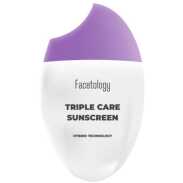Comparison between Azarine Tone Up Mineral Sunscreen Serum SPF 50 PA++++ vs. Facetology Triple Care Sunscreen SPF 40 PA+++
- 20 components -
- 42 components -
Find out which product is better for your skin.
Ingredients in both products 6
Components only in Azarine Tone Up Mineral Sunscreen Serum SPF 50 PA++++ 14
Uniqueness: 70.0%
Components only in Facetology Triple Care Sunscreen SPF 40 PA+++ 36
Mineral Oil, Ethylhexyl Methoxycinnamate, Niacinamide, Centella Asiatica (Gotu Kola) Extract, Ethylhexyl Salicylate and 31 more. Show all.
Uniqueness: 85.7%
Face to Face
Components position by position
1
Water
1
Water
2
Titanium Dioxide
2
Mineral Oil
3
Zinc Oxide
3
Ethylhexyl Methoxycinnamate
4
Glyceryl Stearate SE
4
Niacinamide
5
Glycerin
5
Glycerin
6
Squalane
6
Centella Asiatica (Gotu Kola) Extract
7
Silica
7
Titanium Dioxide
8
Propanediol
8
Ethylhexyl Salicylate
Show others
Positive Effects
Find out what good effects the product has
Both products provide the following effects: , UV Protection, Moisturizing, Cleansing, Pore Shrinking, Softening, Soothing, Anti-aging, Rejuvenation, Antiseptic, Regeneration, Protection, Hair conditioning, Hair structure improvement, Hair gloss, Hair protection
Effects unique for Tone Up Mineral Sunscreen Serum SPF 50 PA++++:
No unique effects found
Effects unique for Triple Care Sunscreen SPF 40 PA+++:
Antioxidant, Acne fighting, Lightening, Lifting, Healing, Elasticity improvement, Antistatic, Antifungal, Deodorant, Hair strengthening, Hair growth stimulating-- Show more --
ECO Metrics
Find out how eco-friendly the components are
Vegan
No
No
Cruelty free
No
No
Reef safe
Yes
Yes
Ozone layer safe
Yes
Yes
Organic score
natural
6 out of 20
30%
chemical
12 out of 20
60%
natural
14 out of 42
33%
chemical
18 out of 42
43%
Concerns
Pay attention to this information
-- Extra information --
Components by Skin Type
Find out what components are good or bad for your skin type
Dry skin
Positive: 3Negative: 0
Glycerin#5Sodium Hyaluronate#12Allantoin#14
Oily skin
Positive: 2Negative: 1
Zinc Oxide#3Allantoin#14Glyceryl Stearate SE#4
Sensitive skin
Positive: 3Negative: 0
Titanium Dioxide#2Zinc Oxide#3Allantoin#14
Dry skin
Positive: 4Negative: 0
Glycerin#5Morus Alba Bark Extract#18Propylene Glycol#29Butylene Glycol#36
Oily skin
Positive: 1Negative: 2
Zinc Oxide#10Glycine Soja (Soybean) Oil#11Polyglyceryl-3 Diisostearate#12
Sensitive skin
Positive: 2Negative: 1
Titanium Dioxide#7Zinc Oxide#10Citric Acid#35

